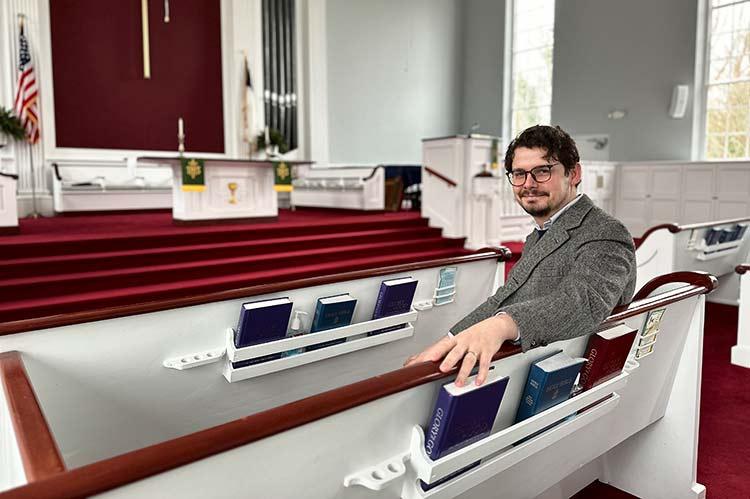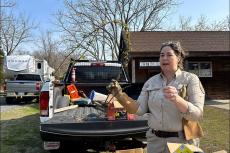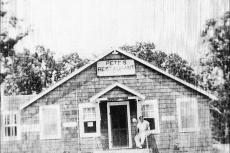It took nearly two years of searching, so when the Rev. Jon D. Rodriguez agreed to become pastor of the East Hampton Presbyterian Church, it’s fair to say the congregation felt its prayers had been answered.
In Mr. Rodriguez, who arrived in mid-January, the church has found a dynamic and engaged young leader who hopes to be in the pulpit here for years to come.
“Most of what I’ve been doing outside of writing sermons and doing funerals in my first two weeks has just been being a student of the culture,” he said on a Friday morning in early February.
He researches, he reads the local paper, and he definitely listens — to what people are saying and to the undercurrent that runs through these conversations, “the story people tell themselves about the way things got to be the way they are.” He has picked up on the fundamental questions of identity that people seem to grapple with here. “There’s a really big story that in many ways depends on who you ask: the folks who had to sell the family farm, the people who brokered the deal, and the people who bought the family farm.”
“When I was thinking about taking my next call, I thought the best thing I can do is research and take the best guesses from experts about what will the demographics be like, what will the economy be like, what will the environment be like over the next 15 to 20 years. A personal philosophy of mine is to serve as few churches as possible.”
“I’m trying to get to the point where I understand the issues that are not just immediate — though those are important — but also the generational issues,” he said. “I hope to be here for a long time. I hope to make a dent in these things. I also think about it when it comes to the youth, especially. Is there a future in East Hampton for any of our high schoolers? If they inherit a home, maybe if they do very well and can buy a home, maybe. But it sounds like for the average person, there’s no coming back. And that’s really very difficult, especially for a church, because we need a new generation.”
He has already seen “this real existential threat of cultural memory just evaporating as folks die off and no one being local and present enough to take up the reins and keep it going.”
He was also quick to notice how central the issue of housing and its high cost is here, “and how, to choose to live here, as a non-very-wealthy person or someone who doesn’t come from generational wealth in the form of land or money, is really just to choose poverty. . . . To choose to be on the East End for the normal average person is to choose a very difficult path knowingly.”
There is “a rootedness among the people that, having been a son of the Dallas suburbs, did not exist for me. The school I went to didn’t exist 10 years prior to my graduation. . . . Everything was completely new in the past generation. And here, it’s quite the opposite.”
Mr. Rodriguez lived in Jacksonville, Fla., until he was 4, then in New Orleans, and from age 9 until he left for the seminary he was in Texas, attending high school in north Dallas and then Texas State University, where he studied public relations and mass communications. He and his wife, Alyson, now a nurse, both had other careers before. She worked in a medical spa, he in digital marketing.
“It was very vacuous; it just felt very pointless.” He found that he felt the opposite about volunteer work with his home church in Dallas, “planting a new church in Austin,” and that led him to Princeton Theological Seminary to study for a Master of Divinity degree. The pandemic came halfway through his studies, and he did his final exams remotely from Texas before being ordained in March 2022.
When his wife was accepted into the graduate program at Columbia University’s School of Nursing, he followed her to New York City, where he served as pastoral resident for communications and evangelism at the Madison Avenue Presbyterian Church. She has since graduated and until relocating to East Hampton earlier this month was working as an operating room nurse at Memorial-Sloan Kettering. She plans to continue as an oncology nurse on the East End.
At Madison Avenue, the city story was the church’s story, but in East Hampton, he said, “the church’s story is the village’s story. . . . These other cultural institutions come and go, but the church has always been here.” Learning the church’s place in the community means listening not only to its members but to people who have attended a concert there, sent their children to the nursery school at the Session House, or been to an A.A. meeting there.
“The church doesn’t exist for itself,” he said. “What happens on Sunday is for the larger community. That is our theology, it reaches out. . . . We come on a Sunday and we hopefully hear some instruction . . . and that propels us into our community during the week, and that’s where the real work of the church happens.”
Outside of the church walls, he wants people “to know that the church is a place that they can depend upon, that it’s an institution that exists for the good of the community. . . . The church has a role to play in the larger issues. . . . How can the church be involved in affordable housing? How can the church be involved in welcoming immigrant communities?”
As he began to learn about the East End, he was especially intrigued “that we have this Spanish-speaking community that is incredibly diverse, the countries represented, the amount of time they’ve been in the U.S. Some have been here generations now. And they have families and businesses and roots. But you might not know it, depending on where you’re spending your time.”
He sat down last month with Minerva Perez, executive director of Organizacion Latino-Americana, to talk about how the church could be more connected to the demographic OLA represents and to explore “How can the church better reflect the community? . . . If we don’t embrace the incoming demographic changes, there will no longer be a need or place for us as a church.”
While his last name might suggest otherwise, he did not grow up in a Spanish-speaking household. In Texas, Rodriguez is a common surname, and it wasn’t until he was at seminary in New Jersey that “I had to give a second thought to my identity from an ethnic perspective. . . . Hispanic, but I didn’t grow up in a Spanish-speaking home; Rodriguez, but by way of Spain, not South America or Central America.”
“Our denomination is like 98-percent white, and that’s anywhere you go,” he said, but the Presbyterian Church is also making a big push to improve racial and ethnic diversity. The East Hampton congregation is embracing this, but Mr. Rodriguez acknowledged that for some it can be “a scary conversation, because the ideas of where you are born and what you look like are so politicized folks don’t want to say the wrong things. And that’s a good impulse, but it keeps important conversations from happening.”
“How are we as a congregation going to become more welcoming when folks who don’t look like us walk through the door? That doesn’t happen without sincere effort,” he said. “I want the church to be all it can be. I have no doubt it’s going to exist for another 100 years. I’m truly not worried about that. I’m worried about it selling its birthright for something lesser. It could be . . . all things to all people,” and it shouldn’t settle for an hour on a Sunday.




